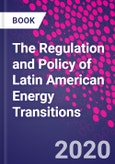The Regulation and Policy of Latin American Energy Transitions examines the ongoing revolution within the energy landscape of Latin America. This book includes real-world examples from across the continent to demonstrate the current landscape of energy policy in Latin America. It focuses on distributed energy resources, including distributed generation, energy efficiency and microgrids, but also addresses the role of less common energy sources, such as geothermal and biogas, as well as discusses the changing role of energy actors, where consumers become prosumers or prosumagers, and utilities become service providers. The legal frameworks that are still hampering the transformation of the energy landscape are explored, together with an analysis of the economic, planning-related and social aspects of energy transitions, which can help address the issue of how inequalities are affecting and being affected by energy transitions.
The book is suitable for policy makers, lawyers, economists and social science professionals working with energy policy, as well as researchers and industry professionals in the field. It is an ideal source for anyone involved in energy policy and regulation across Latin America.
Please Note: This is an On Demand product, delivery may take up to 11 working days after payment has been received.
Table of Contents
Part 1: Changing the energy landscape: Policy and economic issues 1. Is there a Latin American electricity transition? A snapshot of intra-regional differences 2. Using market mechanisms for a reliable energy transition in Latin America 3. Assessing the macroeconomic effects of sustainable energy transitions in Costa Rica and Chile:?A multi-sectoral balance of payments constrained growth approach 4. Energy (and climate) challenges in South America: What planning for what transition? 5. Prompting an energy transition: How policy entrepreneurs passed Peru's first renewable energy legislation for the grid 6. The challenges and contradictions of Peru's Proyecto Masivo de Energ?a SolarPart 2: Energy transition taking shape: Regulatory issues 7. The prosumer protection in Latin America: A requirement for an energy transition 8. Challenges of South American energy transition: Energy efficiency and distributed generation 9. Urban microgrids: benefits, challenges and business models 10. Regulatory aspects of energy efficiency in Uruguay 11. The Ecuadorian energy matrix: From a fossil dependency to a renewable production 12. Environmental impact assessment and public participation of geothermal energy projects: The cases of Chile, Costa Rica, Colombia and Mexico 13. Competitive renewables as the key to energy transition
RenovaBio: The Brazilian biofuel regulation 14. The role and impacts of policies in hampering the biogas transition in Brazil
Part 3: Boosting energy transition: Socio-technical issues 15. Foresight for Chile's energy transition: Unleashing societal transformations 16. Integrating social and justice dimensions to energy transitions: The case of?Mexico 17. The role of social resistance in shaping energy transition policy in Mexico: The case of wind power in Oaxaca 18. Energy transition in isolated communities of the Brazilian Amazon 19. An inclusive and participative model for energy transition in Latin America: The case of Chilean Generacion Comunitaria








